

|
|
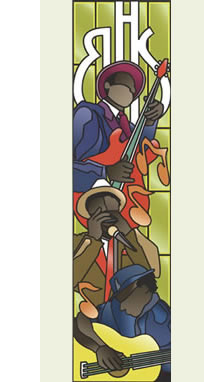 |
| For the thirteenth year, Blue Heaven Studios will host the world-renowned Blues Masters at the Crossroads, a two-night concert housed in a converted church sanctuary. You've never been to a concert like this! Purchase Blues Masters at the Crossroads 13 Tickets
|
| Friday, October 22nd |
 Moreland & Arbuckle Moreland & ArbuckleLet’s welcome a couple of homeboys to Blue Heaven Studios. In Kansas, where good blues is separated usually by great distance, anything within 100 miles has got to qualify as blues local. These guys are from Wichita. Singer and harp man Dustin Arbuckle said he attended early Blues Masters shows when he was just finding his voice, and he cites meeting Hubert Sumlin in the church basement as one of his biggest thrills. Arbuckle said upon confirming this gig that it’d been a dream of his ever since to play Blues Masters at the Crossroads. Arbuckle first met guitarist Aaron Moreland at an open mic jam in Wichita in 2001. Since, they’ve been honing a relentless and haunting sound that merges Delta blues, folk, rock, traditional country and soul. The duo is actually most often booked as a three-piece, with drummer Brad Horner holding it down. Arbuckle takes the vocals and brings a throw-back-styled, rich-toned harmonica. Moreland plays all kinds of guitars, including a handcrafted cigar box model. Four strings are stretched across a cigar box, with one string feeding into a bass amp and the other three into a guitar amp. It’s a gritty, electrified descendent of the cigar box guitars that Delta bluesmen of the early 1900s often employed. While Arbuckle, a Wichita native, was mostly influenced by Delta blues, country and bluegrass music, Moreland, from Emporia, grew up listening to everyone from Led Zeppelin and Black Sabbath to Charley Patton and Muddy Waters. And all of that makes the cut in this group’s style and sound. Unconfined by convention, Moreland attributes the group’s growing popularity to their unique sound and instrumentation. Arbuckle adds, ”It’s hard to say exactly what we are and what we do…We always try to stay grounded in that traditional blues center, and at the same time branch out and do as many different things as we can while still keeping it consistent with the sound we’ve developed.” And it’s working. The gigs started coming from further away and more often beginning just a few years ago. Now, Moreland & Arbuckle are among the more familiar names found from any search for today’s blues festivals and venues. It would sure seem we’re seeing an act on it’s way up. Moving quickly, too. |
 Janiva Magness Janiva MagnessA charismatic performer known for her electrifying live shows, Janiva Magness is a gutsy and dynamic musical powerhouse. She received the coveted 2009 Blues Music Awards for B.B. King Entertainer of the Year (she is only the second woman to ever win this award, Koko Taylor being the first) and for Contemporary Blues Female Artist of the Year, an honor she also received in 2006 and 2007. While Magness is now a bona fide blues star, her climb to get there involved exceptional challenge. Born in Detroit, Magness was inspired by the blues and country she heard listening to her father’s record collection, and by the vibrant music of the city’s classic Motown sound. By her teenage years, though, her life was in chaos. She lost both parents to suicide by the age of 16 and bounced between 12 foster homes in two years. At 17, she became a teenage mother who gave up her baby daughter for adoption. One night in Minneapolis, an underage Magness sneaked into a club to see blues great Otis Rush, and it was there that she found her salvation. Magness recalls, “Otis played as if his life depended on it. There was a completely desperate, absolute intensity. I knew, whatever it was, I needed more of it.” She began going to as many blues shows as possible, soaking up the sounds of her favorite artists, including Johnny Copeland and Albert Collins. Magness’ first break came several years later, while working as an intern at a recording studio. Her boss asked her to sing supporting vocals on a track. Finding her voice, she soon began working regularly as a background singer. By the early 1980s, Magness made her way to Phoenix and befriended Bob Tate, the musical director for the great Sam Cooke. With Tate’s mentoring, she formed her first band, Janiva Magness And The Mojomatics, in 1985, and before long the influential Phoenix New Times named her group the city’s Best Blues Band. She moved to Los Angeles in 1986 and slowly began finding work. She married musician and songwriter Jeff Turmes, with whom she recorded her second studio album, It Takes One To Know One (her debut was the cassette-only release, More Than Live). After three more independent releases, Janiva signed with Northern Blues and recorded Bury Him At The Crossroads in 2004 and Do I Move You? in 2006. Both CDs were co-produced by Magness and Canadian roots star Colin Linden, and Magness and Linden won the prestigious Canadian Maple Blues Award for Producers of the Year for Bury Him At The Crossroads. Do I Move You? debuted at No. 8 on the Billboard Blues Chart and was the No. 1 Blues CD of the Year in 2006 on Living Blues magazine’s radio chart. Magness signed with Alligator in 2008 and released What Love Will Do to massive critical acclaim. She followed up earlier this year with The Devil Is An Angel Too, also on Alligator. |
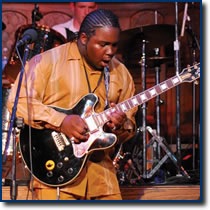 Marquise Knox
Marquise Knox Man Child is the title of Marquise Knox's national debut record, and for good reason. Yes, he was just 16 years old for this recording at Blue Heaven Studios and released on APO Records, but no, this is not another one of those guitar-hero, someday-my-vocals-may-mature, I-might-one-day-write-my-own-material records. This kid is flat-out for real! This is a man-sized offering of serious, mature blues. In fact, it's the maturity that provides the shock value here. Sixteen years old?! Listen to that voice and you'll swear he's lying about his age. Guitar licks that are tasty and restrained, none of this hyper-active, self-absorbed speed metal that somehow gets confused with blues. Knox has already won the approval of B.B. King, Henry Townsend, Robert Lockwood Jr., Big George Brock, Bob Margolin, Sam Lay...Read those names again. Do you really think we're talking about a novelty act here? And he's an original. All but one of the tracks on Man Child were penned by Knox, and most of them were written in the studio, on-the-fly, a skill learned at least partially by one of Knox's main heroes, Henry Townsend. Knox has performed on the past three Blues Masters' bills. As the youngest performer on lineups chock full of legends, he still prevailed as one of each weekend's most obvious crowd favorites. Now 19 years old, Knox is beginning to rack up national acclaim. He's booked festivals around the world, and recently Man Child won Living Blues Magazine's Award For Best Debut Recording. Clear the way for the Man Child. |
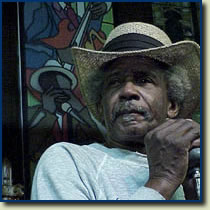 Lazy Lester
Lazy LesterLeslie Johnson was born June 20, 1933 in the small town of Torras, Louisiana, and was raised mostly in Scotlandville, a suburb of Baton Rouge. As a boy, he worked at a grocery store, where he purchased a harmonica and Little Walter's famous "Juke" record. Lester began to blow harp and later learned to strum his brother's guitar. It was in the mid-1950s that fate turned Lester's way. He was living in Rayne, Louisiana, at the time and was on the bus riding home. Lightnin' Slim, who was already an established recording artist, was also on the bus and was headed to Crowley to cut a record at Jay Miller's Studio, where so much of the material for the Nashville-based Excello Records was being recorded. Lester stayed on the bus and accompanied Slim to the studio. When they got there, the scheduled harp player didn't show for the session. Lester told Slim that he thought he could handle the harp parts for the session. Remarkably, Slim and Miller gave Lester that chance, and he did not disappoint. A classic pairing was born, and Lester became a mainstay on Slim's Excello recordings and gigs. Miller was impressed by Lester's work, and in 1957 Lester debuted as a lead artist on Excello. Before Lester's first record release, Miller had decided that "Lazy Lester" had more of a ring to it than "Lester Johnson." Lester's first legitimate hits came in 1958 with the release of "I'm A Lover Not A Fighter" backed with "Sugar Coated Love." Those two songs established Lester as a star. He hit again with the follow-up record, "I Hear You Knockin'"/"Through The Goodness of My Heart." Lester remained a regular Excello artist, making 15 records for the company. In 1975, Lester moved to Pontiac, Michigan. He retired from music until the late '80s when he recorded Lazy Lester Rides Again for the Blue Horizon label, winning a W.C. Handy Award. That led to a deal with Alligator Records. Since, he's recorded twice for Antone's and cut one direct-to-disc for APO Records, recorded here at Blue Heaven Studios. |
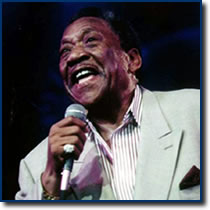 Bobby "Blue" Bland Bobby "Blue" BlandAll of the Blues Masters performers of the past 12 years are "masters" in our minds here at Blue Heaven Studios, hence the name of the annual concerts and the reason why these specific artists have been chosen. But they haven't all been "stars." Fact is, there aren't many "stars" in the blues genre. Now, ladies and gentleman, it's star time. This – by any historic account, by name recognition, by record sales numbers – is the big time. This is Bobby "Blue" Bland. Check that. This is Bobby "Blue" Bland in an old church sanctuary with the intimacy of a large living room. Yeah. This is a treat. Bland is of course one of the most influential rhythm and blues singers of all time. He's the source of such standards as "Turn On Your Love Light," "Further On Up The Road" and "I Pity The Fool." He had a string of hits that stretched over 40 years. Born in 1930 in the small town of Rosemark, Tennessee, Bland moved with his mother the 25-some-miles to Memphis when he was 17. His career began soon thereafter when he hooked up with a loose-knit group casually billing themselves as the Beale Streeters that also included youngsters B.B. King, Rosco Gordon (a 2001 Blues Masters alum) and Johnny Ace. Talk about a gathering of future stars. When Gordon scored his first hits and became in-demand, he hired Bland as his chauffer and valet and allowed the young singer to open his shows. Bland's first recording was for Chess in 1951 and featured Ike Turner on piano and Matt "Guitar" Murphy on guitar. Other early ‘50s releases included a duet with Junior Parker and Bland's debut for the Memphis-based Duke label, "I.O.U. Blues" backed with "Lovin' Blues," featuring B.B. King on guitar. The Army drafted Bland in 1952 and stationed him in Texas. While there, he gigged some in Houston and recorded for Houston record mogul Don Robey on his Peacock label. Around that same time Peacock merged with the Duke label out of Memphis and Robey soon took control of both and based them in Houston. Upon Bland's discharge in '55, he began his wildly successful run on the Duke imprint. Bland hit almost immediately with "It's My Life Baby" backed with "Time Out," featuring Roy Gaines on guitar. He then paired with Junior Parker. Billing themselves as Blues Consolidated, they dominated the chitlin' circuit. Bland's first No. 1 hit came in 1957 with "Farther Up The Road" (usually named "Further On Up The Road" in later versions). Follow-up records included two 1961 hits, "I Pity The Fool," which also went to No. 1 on the R&B charts, and "Turn On Your Love Light," which went to No. 2. "That's The Way Love Is," a 1963 release, gave Bland his third No. 1 hit. He rolled through the ‘60s, his star status ever-increasing, with more hits in "I'll Take Care Of You," "Two Steps From The Blues" (written by 2004 Blues Masters alum Texas Johnny Brown), T-Bone Walker's "Stormy Monday Blues," "Ain't Nothing You Can Do," "Ain't Doing Too Bad," "Poverty" and several others. In 1973, Robey sold his labels to ABC Records, and Bland was part of the deal. A couple of memorable albums came with 1973's His California Album and Dreamer the following year. He teamed with his old friend B.B. King for a couple of mid-‘70s releases. Bland isn't a songwriter and he plays no instrument. Still, he's had unbelievable staying power using one of the most distinctive singing voices ever heard from any genre. There's a crying element to it, definitely some gospel flavorings, and of course there's that throaty frog-like growl that's long been a trademark. In any case, it was that voice and all of those unforgettable songs that kept Bland working more than 300 dates a year for several decades. Bland was inducted into the Blues Foundation's Hall of Fame in 1981 and into the Rock & Roll Hall of Fame in 1992. |
| Saturday, October 23rd |
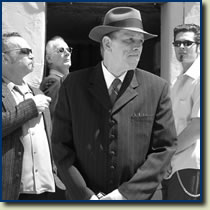 Watermelon Slim Watermelon Slim Prepare for a back-story most find hard to believe. Bill “Watermelon Slim” Homans was born in Boston. His father was a progressive attorney and ex-freedom rider and his brother is a classical musician. Slim was raised in North Carolina, and as a boy listened to the housekeeper sing John Lee Hooker songs. He attended Middlebury College in Vermont on a fencing scholarship but dropped out to enlist in the Army for the Vietnam War. While laid up in a Vietnam hospital bed, he taught himself upside-down, left-handed slide guitar on a $5 balsawood model using a pick cut from a rusty coffee can top and his Army-issued Zippo lighter as the slide. An ambitious and fast learner, Slim hit the music scene with the 1973 release of Merry Airbrakes, a protest-tinged psychedelic blues-rock LP with tracks Country Joe McDonald later covered for his anti-war projects. In the 37 years since, Slim has worked as a truck driver, a forklift operator, a saw miller (where he lost part of a finger), a funeral officiator and at times as a small-time criminal. Due to the latter vocation, Slim fled the law in Boston where he had been playing peace rallies and sit-ins with the likes of Bonnie Raitt. He went to Oklahoma to lay low and farm watermelons, hence his stage name. Somewhere in between all those jobs Slim earned two undergrad degrees along with a master’s, he started a family, painted art and briefly joined Mensa. The social networking group reserved for those with certified genius IQs didn’t keep his attention. He prefers to fish, read Shakespeare and keep bowling a steady 240. In 2002, Slim suffered a near-fatal heart attack. The event offered Slim new perspective on life ambitions and motivated his second emergence as a performing musician. In less than a decade he has risen from unheard-of to genre-topper. Legendary record producer Jerry Wexler became a fan and eagerly penned liner notes for Slim’s 2007 release, labeling him as a “one-of-a-kind pickin’ ‘n’ singing Okie dynamo.” Slim’s won Blues Music Awards for “Band of the Year” and “Album of the Year.” Mojo Magazine awarded him top honors in consecutive annual polls, and he’s graced many magazine covers. He tied B.B. King, Buddy Guy and Robert Cray with a record six Blues Music Awards nominations - two years in a row. His music is singular, raw and honest, drawing from his storied past. While trucking and hauling industrial waste for thankless bosses at hourly wages to support himself and his family, he improvised a cappella in his rig keeping him dedicated, awake and entertained. With an amalgam of country, blues, Americana and rock his latest album, Ringers, captures those long hours, life struggles and small victories of now and then. |
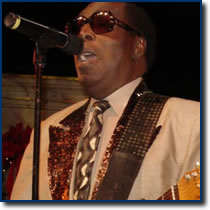 Clarence Carter Clarence CarterBorn in Montgomery, Alabama, in 1936 and blind since birth, Clarence Carter was playing guitar by the time he was 11, his own style influenced by the blues records of John Lee Hooker, Lightnin' Hopkins and Jimmy Reed. After attending college and earning a degree in music, Carter hooked up with another blind musician, keyboard player Calvin Scott, in 1963. As Clarence & Calvin, the duo recorded for a couple of different labels. A 1965 recording session in Muscle Shoals, Alabama, at producer/owner Rick Hall's Fame Studio (later to be known as "the Home of Southern Soul" because of hits by Aretha Franklin, Wilson Pickett, Etta James and others) proved a turning point. The song the duo cut, "Step By Step," came to the attention of Atlantic Records executive Jerry Wexler and although it wasn't a hit, the company became aware of Carter's bluesy, distinctive vocal sound. After partner Calvin was injured in an auto accident, Clarence took the solo route, recording for producer Hall's Fame label and scoring some R&B success. Carter signed with Atlantic directly in 1968 and followed his first Top 20 R&B hit ("Looking For A Fox") with the classic "Slip Away." It's worth noting that "Slip Away" might never have been a big hit if radio disc jockeys hadn't discovered it on the B-side of an up-tempo ditty called "Funky Fever," which Atlantic Records released in May 1968. The original A-side, "Funky Fever," inched its way into the R&B Top 50, but once deejays flipped it over and heard the infectious "Slip Away," Carter found himself with his first major hit. Carter kept his chart momentum going with hits like "Too Weak To Fight," "Snatching It Back," "The Feeling Is Right," "Doin' Our Thing" and "I Can't Leave Your Love Alone," all Top 10 R&B hits within an 18-month period following "Slip Away." In summer 1970, Carter scored his biggest pop success with the song "Patches," which had originally appeared as an album track by Detroit group The Chairmen Of The Board. A million-seller for Carter, "Patches" was revived by B.B. King and George Jones as part of the best-selling Rhythm, Country & Blues album in 1994. With a total of four Atlantic albums (and a greatest hits collection) under his belt, Carter left the label and recorded for producer Rick Hall's Fame label. Subsequently, he signed with ABC Records and had records out on Venture Records (most notably the 1981 album Let's Burn) before releasing records on his own Big C label. In 1985, Carter (who received a Pioneer Award from the Rhythm & Blues Foundation in 1994) began his association with Atlanta-based Ichiban Records. The record Dr. C.C. spawned the major word-of-mouth hit, "Strokin'." |
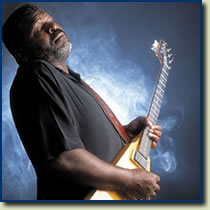 Michael Burks Michael Burks
Michael Burks plows through the blues with relentless power in a show noted for incendiary burn and sweat-drenched passion. A meaty, honest guitar tone and real investment in his craft have made Burks one of the blues world's fastest rising stars. While he was a W.C. Handy Award nominee in 2000 for Best New Artist, Burks is in fact a seasoned veteran in every sense. Born in Milwaukee in 1957, Burks was immediately surrounded by the blues. His father, Frederick Burks, worked in a Milwaukee steel mill by day and spent his evenings playing bass in the city's blues clubs, often backing touring legends like Rice Miller. But the elder Burks' fingers were crushed in a press that made castings for engine blocks, ending his ability to pick the notes on his bass. Still, Frederick Burks encouraged his young son by showing him chords on the guitar and giving him a stack of classic blues 45s from which to listen and learn. Michael Burks' first gig came at age six, when, during a family trip to southern Arkansas, Burks took the stage with his cousin's band and thrilled an unsuspecting audience. When he was 13, Burks visited his mother in California and won an audition over 20-some other guitarists for a spot in a touring pop band called Michael Clay & the Fabulous Souls. Shortly thereafter, Burks and his father returned to his father's native Camden, Arkansas, and opened a juke joint called Bradley Ferry Country Club where Burks played in the house band four nights a week until the club closed when he was coming into adulthood. For the next 13 years, Burks worked a day job as an electronics mechanic at Lockheed Martin. The weekends were for music, and he used the limited time he had to build a local following. Finally, in 1993, Burks became a fulltime bluesman. After years of performing without a record, Burks released his self-produced debut, From The Inside Out in 1997, confidently announcing his intention to take the blues world by storm. Blues Access deemed the record to be "the most impressive Indie in recent memory." The gigs and the acclaim have really picked up for Burks since he signed with Alligator in 2001 and released Make It Rain followed in 2003 with I Smell Smoke and Iron Man in 2008. |
 Bobby "Blue" Bland Bobby "Blue" BlandAll of the Blues Masters performers of the past 12 years are "masters" in our minds here at Blue Heaven Studios, hence the name of the annual concerts and the reason why these specific artists have been chosen. But they haven't all been "stars." Fact is, there aren't many "stars" in the blues genre. Now, ladies and gentleman, it's star time. This – by any historic account, by name recognition, by record sales numbers – is the big time. This is Bobby "Blue" Bland. Check that. This is Bobby "Blue" Bland in an old church sanctuary with the intimacy of a large living room. Yeah. This is a treat. Bland is of course one of the most influential rhythm and blues singers of all time. He's the source of such standards as "Turn On Your Love Light," "Further On Up The Road" and "I Pity The Fool." He had a string of hits that stretched over 40 years. Born in 1930 in the small town of Rosemark, Tennessee, Bland moved with his mother the 25-some-miles to Memphis when he was 17. His career began soon thereafter when he hooked up with a loose-knit group casually billing themselves as the Beale Streeters that also included youngsters B.B. King, Rosco Gordon (a 2001 Blues Masters alum) and Johnny Ace. Talk about a gathering of future stars. When Gordon scored his first hits and became in-demand, he hired Bland as his chauffer and valet and allowed the young singer to open his shows. Bland's first recording was for Chess in 1951 and featured Ike Turner on piano and Matt "Guitar" Murphy on guitar. Other early ‘50s releases included a duet with Junior Parker and Bland's debut for the Memphis-based Duke label, "I.O.U. Blues" backed with "Lovin' Blues," featuring B.B. King on guitar. The Army drafted Bland in 1952 and stationed him in Texas. While there, he gigged some in Houston and recorded for Houston record mogul Don Robey on his Peacock label. Around that same time Peacock merged with the Duke label out of Memphis and Robey soon took control of both and based them in Houston. Upon Bland's discharge in '55, he began his wildly successful run on the Duke imprint. Bland hit almost immediately with "It's My Life Baby" backed with "Time Out," featuring Roy Gaines on guitar. He then paired with Junior Parker. Billing themselves as Blues Consolidated, they dominated the chitlin' circuit. Bland's first No. 1 hit came in 1957 with "Farther Up The Road" (usually named "Further On Up The Road" in later versions). Follow-up records included two 1961 hits, "I Pity The Fool," which also went to No. 1 on the R&B charts, and "Turn On Your Love Light," which went to No. 2. "That's The Way Love Is," a 1963 release, gave Bland his third No. 1 hit. He rolled through the ‘60s, his star status ever-increasing, with more hits in "I'll Take Care Of You," "Two Steps From The Blues" (written by 2004 Blues Masters alum Texas Johnny Brown), T-Bone Walker's "Stormy Monday Blues," "Ain't Nothing You Can Do," "Ain't Doing Too Bad," "Poverty" and several others. In 1973, Robey sold his labels to ABC Records, and Bland was part of the deal. A couple of memorable albums came with 1973's His California Album and Dreamer the following year. He teamed with his old friend B.B. King for a couple of mid-‘70s releases. Bland isn't a songwriter and he plays no instrument. Still, he's had unbelievable staying power using one of the most distinctive singing voices ever heard from any genre. There's a crying element to it, definitely some gospel flavorings, and of course there's that throaty frog-like growl that's long been a trademark. In any case, it was that voice and all of those unforgettable songs that kept Bland working more than 300 dates a year for several decades. Bland was inducted into the Blues Foundation's Hall of Fame in 1981 and into the Rock & Roll Hall of Fame in 1992. |
| Accommodations and Recommended Restaraunts |
